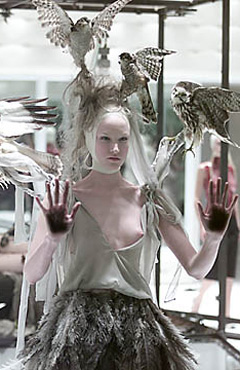Serendip is an independent site partnering with faculty at multiple colleges and universities around the world. Happy exploring!
Notes Towards Day 8 (Thurs, Feb. 9): Making Room for Everyone?


from Miriam Posner's blog about making room in the academy for everyone...
I. coursekeeping:
welcoming Margaret Price, and (@ long last!) Clare Mullaney
on Tuesday, we will shift from this first section of the course,
exploring the evolution of our own (academic) writing
to part 2: exploring the evolution of graphic narratives
please read ALL of Scott McCloud's Understanding Comics
(we'll spend the whole week on it, but it'll work better if
we feel free to range throughout the whole book on Tuesday....)
don't forget, also, to do a forum posting this weekend, either
looking back @ our discussions about digital writing, or
reflecting on the discussion we're going to have now, or
looking forward to the one we'll have on Tuesday....
II. go 'round and introduce yourselves,
tell Margaret your reactions to her Chapter 1,
ask your questions, request further reflections....?
III. Margaret's responses?
and putting her into conversation w/ Judith Butler?
and/or An Active Mind?


IV. Anne's reading notes from Price's Forward, Intro, and Chapter 1:
"If you are crazy, can you still be of sound mind?" (p. 1)
"Madness is usually not threatening" (p. 1).
"Human life is a form of mental illness" (Lawrence Davis, qted. p. 3).
"disability is a mode of human difference ... that becomes a problem only when the environment ... treats it as such .... it shifts the "problem" of disability away from individuals and towards institutions and attitudes" (p. 4).
"the most important common topoi of academe ... include rationality, criticality, presence, participation, resistance, productivity, colegiality, security, coherence, truth, independence" (p. 5).
"Why is 'coherence' one of the most-often emphasized features of a thesis-driven academic argument; does the demonstration of coherence indicate a stronger mind?" (p. 6)
"Those of us who do function successfully in academe tend to pass much of the time" (p. 7).
"For thousands of years academe has been understood as a bastion of reason ....
Academic discourse operates ... to abhor mental disability--to reject it, to stifle and expel it" (p. 8).
"We might reconstruct 'normal' academic discourses to become more accessible for all .... to measure up to us" (pp. 8-9).
"As with queer, the broad scope of mad carries the drawback of generality but also the power of mass" (p. 10).
[Let us] "redesign our social and work environments, emphasizing the importance of interdependence" (p. 13).
"neurodiversity acts as a positive force in human evolution, enabling alternative and creative ways of thinking, knowing, and apprehending the world" (Antonetta, qted. p. 16).
"we need a way of taking inclusively about people for whom access to human interaction is problematic" (Montgomery, qted. p. 19).
"Many of us are mad at school" (p. 20).
"incorporating narratives of experience is one way to improve access to academic prose .... stories I like best ... render their own occasions of telling ... explain how and why they came about" (p. 23).
"attention to discourse is foremost an activist goal" (p. 29).
"madness [is] a radical disunity of perception from that held by those who share one's social context" (p. 32).
"we practice academic discourse ... as a project of social hygiene ... to diagnose, cure, contain, or expel the mad subject .... to protect academic discourse as a 'rational' realm" (p. 33).
[cf. Haraway on the 'god-trick,' and Nagel on the 'view from nowhere': academic discourse] "claims a gaze that comes from nowhere and everywhere all at once, omniscient and unlocatable, and therefore shielded from any countergaze" (p. 35).
[for] "rhetors whose worlds may be ... composed of ways of knowing fundamentally invested in dis/order and non/sense ... attempting to voice the 'truth' of mental disaiblity creates a paradox ... producing rhetoric whose very authenticity destroys its fluency" (pp. 38-39).
"Dialogue ... is impossible ... because ... power relations between raced, classed, and gendered students and teachers are unjust .... all voices in the classroom ... cannot carry equal legitimacy" (Ellsworth, qted. p. 40).
"Is it possible to listen to the mad subject?" (p. 42).
"Critical pedagogy ... requires an uncomfortable state of mind .... fear manifests as resistance .... loss of composure [is an] educational opportunity" (p. 46).
"stop seeing emotion, pain, and trauma as ... anti-intellectual, and solipsistic, and instead ... recognize them as ways of knowing" (p. 50).
[let's] "focus on the disabling aspect of some teaching" (Lewiecki-Wilson and Dolmage, qted. p. 55).
Price says her argument "requires a disorienting shift away from presumptions of tragedy,
courage, or brokenness" (p. 4).
Does applying Price's argument to your first web-event require any disorienting shifts?
What about Butler's call to recognize how precarious (your) life is, how dependent you are on others?
IV. Reading Notes from Chapter 2 of Butler's Precarious Life
finding a basis in community in our vulnerability to loss and mourning
mourn = accept one will be changed by loss, w/ result of transformation not known in advance
experience of transformation reconstitutes choice; we are not the masters of ourselves
ties constitute what we are: the attachment to 'you' is part of what composes who "I' am
I have lost 'you"…'I' have gone missing as well
the thrall in which our relations with others hold us...
in ways that challenge the notion of ourselves as autonomous and in control:
We're undone by each other…One does not always stay intact.
gender and sexuality …is a mode of being dispossessed, a way of being for another
we are constituted by our relations but also dispossessed by them
bodies…are not quite ever only our own. The body has its invariably public dimension
we are compelled to take stock of our interdependence
fundamental sociality of embodied life...by virtue of being a bodily being...
implicated in lives that are not our own
my unknowingness, the unconscious imprint of my primary sociality.
Can this insight lead to a normative reorientation for politics?
Is there something to be gained from grieving…
are we returned to a sense of human vulnerability,
to our collective responsibility for…one another?
to make grief itself into a resource for politics…
from an apprehension of a common human vulnerability
we are given over to the other…even prior to individuation…
this vulnerability…precedes the formation of 'I'
an insurrection @ the level of ontology…
What is real? Whose lives are real? How might reality be remade?
how the obituary functions as the instrument by which
grieveability is publicly distributed…who has access to the public obituary?
ask about the conditions under which a grieveable life is established and maintained….
at what cost do I establish the familiar as the criterion by which a human life is grieveable?
the loss of First Worldism…the prerogative…never to be
in the position of having one's own boundaries transgressed…
the loss of a certain horizon of experience,
a certain sense of the world as a national entitlement
from loss and fragility..the possibility of making different kinds of ties emerges
insisting on a common corporeal vulnerability
we are not separate identities…but are already involved in a reciprocal exchange...
that dislocates us from our subject-positions
To ask for recognition…is to solicit a becoming…
to stake one's…own persistence in one's own being…in the struggle for recognition
At the most intimate levels, we are social…
outside ourselves, constituted by cultural norms that precede and exceed us
The 'I' cannot come into being without a 'you'
I am not fully known to myself, because part of what I am is the enigmatic traces of others
an international coalition…will have to accept the array of sometimes incommensurable
epistemological and political beliefs and modes and means of agency
fundamental modes of dependency bind us…
the basis of our vulnerability, affiliation, and collective resistance
I am nowhere without you…
my own language must break up and yield if I am to know you.
You are what I gain through this disorientation and loss.
This is how the human comes into being…as that which we have yet to know.


